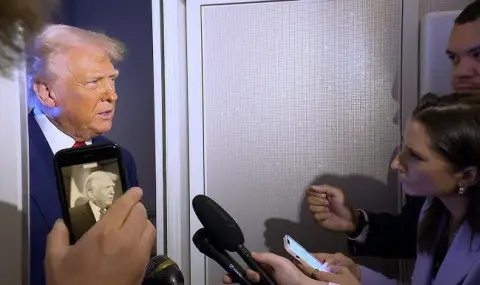The US administration will not allow Iran to acquire a nuclear weapon, said US President Donald Trump on the occasion of the talks scheduled for today in Oman between delegations of the two countries on Tehran's nuclear program.
"I want them not to have nuclear weapons. I want Iran to be a wonderful, great, happy country, but they cannot have nuclear weapons and we will consult with them on Saturday. We have a big meeting with them. I want Iran to prosper, but they cannot have nuclear weapons,", Trump emphasized to journalists on board the presidential plane.
According to the White House, today's negotiations will be conducted directly, according to Tehran - through intermediaries. The US delegation is expected to be led by the president's special envoy, Stephen Witkoff, and the Iranian delegation by Foreign Minister Abbas Araghchi.
Tehran is pushing for the finalization of the Joint Comprehensive Plan of Action on Iran's nuclear program, suggesting that the document include the possibility of imposing sanctions on the country that decides to withdraw from the agreement in the future. The United States, for its part, is pushing not only to prevent the development of the military component of Iran's nuclear program, but also to completely dismantle all Iranian nuclear facilities. Washington has also demanded that Tehran stop supporting its allies in the Middle East and limit Iran's ballistic missile program.
Iran categorically rejects any attempts to limit its foreign policy and defense capabilities, emphasizing its right to develop peaceful nuclear energy.
The United States must appreciate that Tehran has agreed to negotiate despite Washington's continued aggressive rhetoric, the Iranian Foreign Ministry stressed yesterday.
After taking office as head of state, Donald Trump signed an executive order returning to a policy of maximum pressure on the Islamic Republic and threatened it with "large-scale bombing" if it does not agree to resolve the crisis over its nuclear developments through diplomatic means.
Iran has said that it will respond harshly to any threats to its security. Tehran has repeatedly said that accusations of trying to develop nuclear weapons are baseless, as the country's Supreme Leader Ayatollah Ali Khamenei banned their development in a fatwa (religious edict) in 2003.
Western countries accused Iran of trying to develop nuclear weapons as early as 2002. Subsequently, both unilateral sanctions (by the US and the European Union) and international sanctions (by the UN Security Council) were imposed on the republic. Most of the sanctions were lifted under the JCPOA, which Iran signed with the UK, Germany, China, Russia, the US and France. Tehran agreed to limit its nuclear program, the level of uranium enrichment and the volume of its stockpiles.
In 2018, during his first term as president, Trump announced the US withdrawal from the agreement and reimposed all US sanctions on Iran. The EU also restored most of its restrictions. Tehran continued to unilaterally comply with the JCPOA for two years, but in 2020 it retaliated by reducing its commitments to limit uranium enrichment levels and blocking access to some nuclear facilities for International Atomic Energy Agency (IAEA) inspectors, and refusing direct dialogue with Washington.
After Joe Biden took office as US president in 2021, negotiations with Iran to restore the nuclear deal were renewed. Consultations were held in Austria and Oman. The Vienna process ended without results in 2022, and contacts in Muscat were suspended due to the Israeli invasion of Lebanon in October 2024. In 2024 and early 2025, representatives of the EU3 (Great Britain, Germany and France) held meetings with Iranian representatives in Geneva, trying to mediate Tehran's future negotiations with Washington. Their efforts were in vain. Tehran believes that these countries, like the United States, are pursuing a hostile policy, imposing sanctions and making unacceptable demands.
After Trump returned to the White House, the United States threatened Iran with military force, deployed additional forces to the Middle East, and imposed new sanctions targeting Iranian oil exports. Relations between the two countries have seriously deteriorated. Nevertheless, Tehran and Washington have decided to start a dialogue.
On March 7, Trump sent a message to Khamenei with a proposal to hold negotiations on the nuclear program. According to Iranian authorities, the letter was aggressive in nature. Tehran refused direct dialogue with the United States, but allowed the possibility of continuing consultations through intermediaries. On April 7, it became known that after the correspondence, the parties had agreed to hold the first round of negotiations on April 12 in Oman. Before the meeting, Trump again threatened Iran with military action and said that Israel would be directly involved in a possible military operation. However, the president assured that the United States would like to resolve the crisis diplomatically.
Trump emphasized that the United States and Iran have "little time" left to reach an agreement. As early as October 18, 2025, Western countries will be able to activate the rapid return mechanism provided for in the JCPOA, which will automatically lead to the restoration of UN Security Council sanctions against Tehran. Iran has said it will withdraw from the Nuclear Non-Proliferation Treaty if that happens. The country has threatened to expel all IAEA inspectors and stop cooperating with the agency if the US and Israel continue to threaten military force. It remains unclear, however, whether leaving the Nuclear Non-Proliferation Treaty would lead to the development of nuclear weapons - this would require the revocation of Khamenei's 2003 fatwa.
Iranian authorities emphasize that there can be no question of changing their position - the Islamic Republic "has not created, does not create and will not create nuclear weapons".
The categorical demands of the United States, which go beyond the discussion of the nuclear program, could lead negotiations with Iran to a dead end and provoke a military escalation in the Middle East, international analysts note.
In March and April 2025, Russia, China and Iran held trilateral consultations on nuclear issues to agree on an approach to future negotiations.
